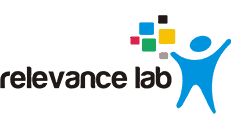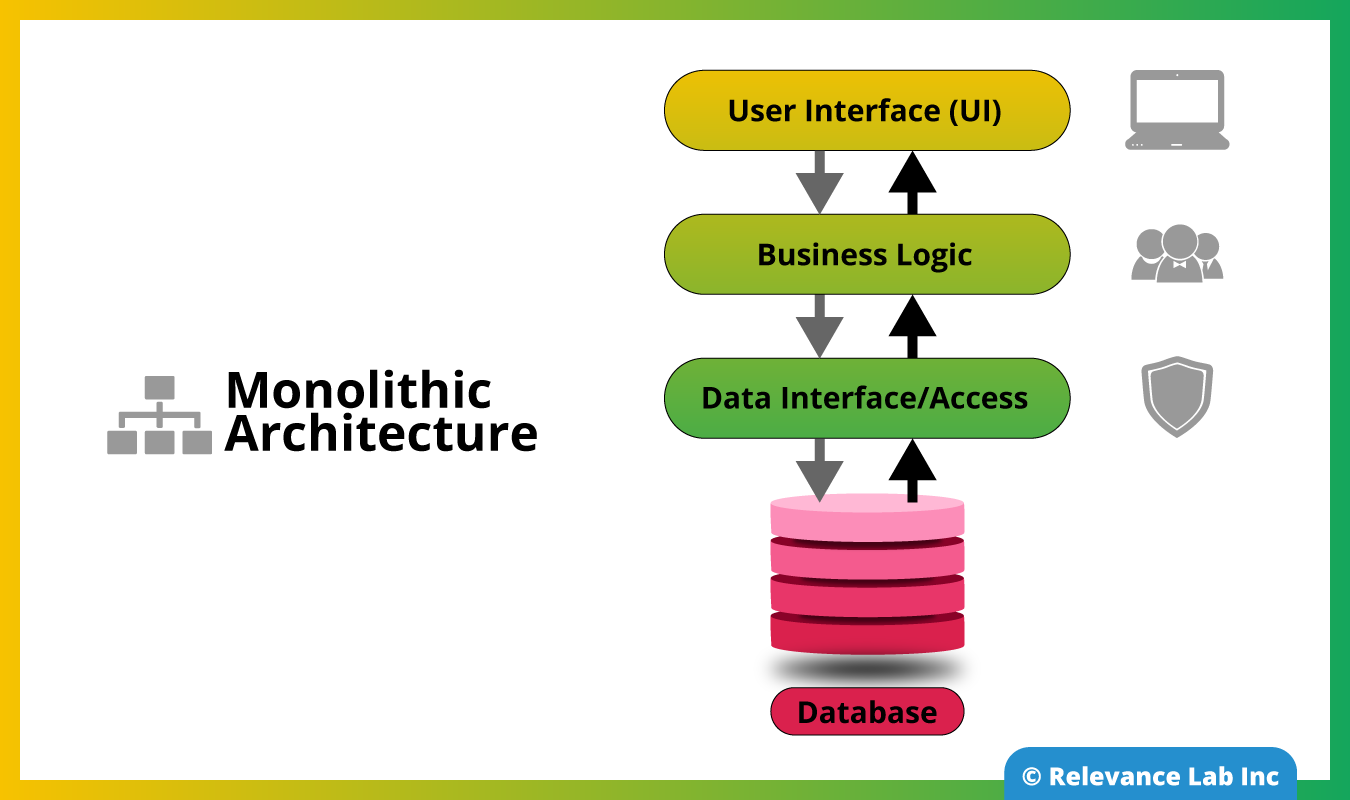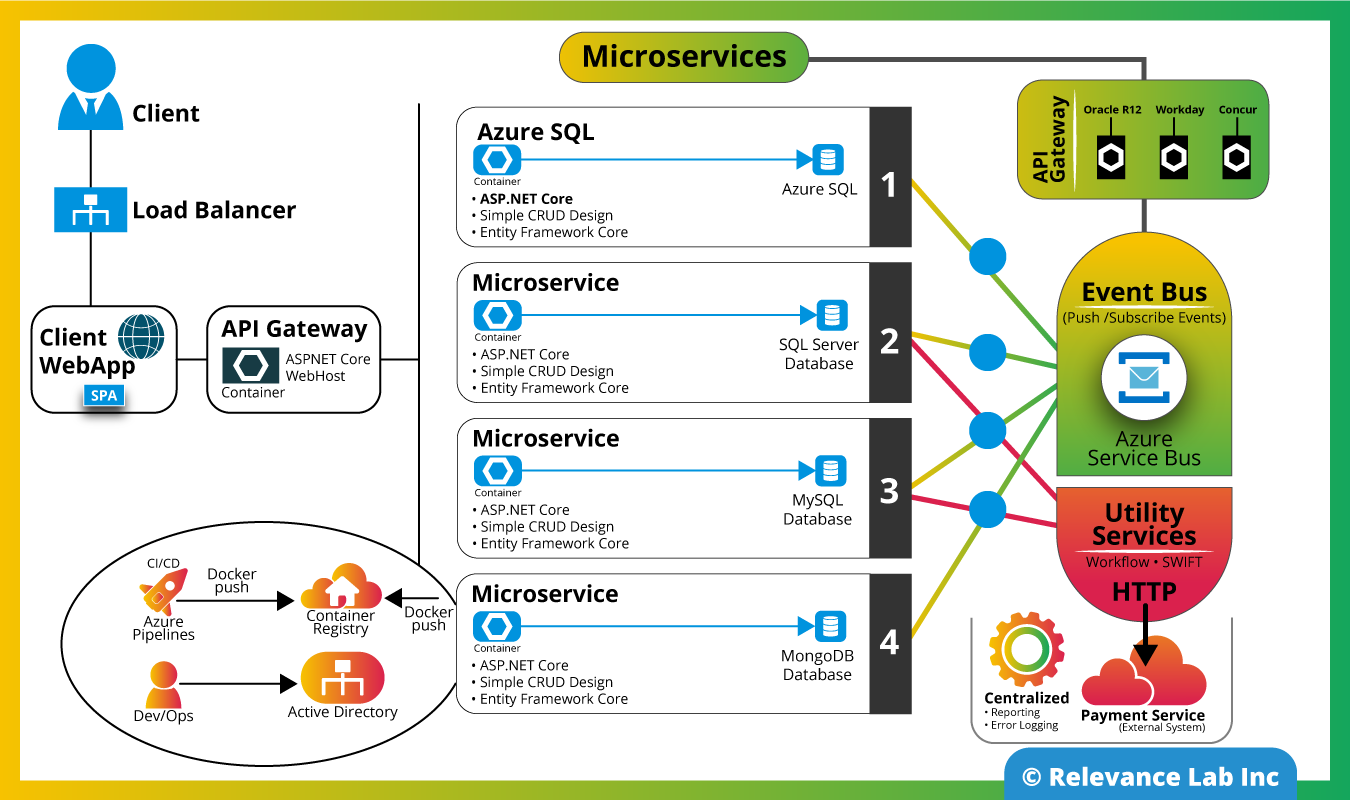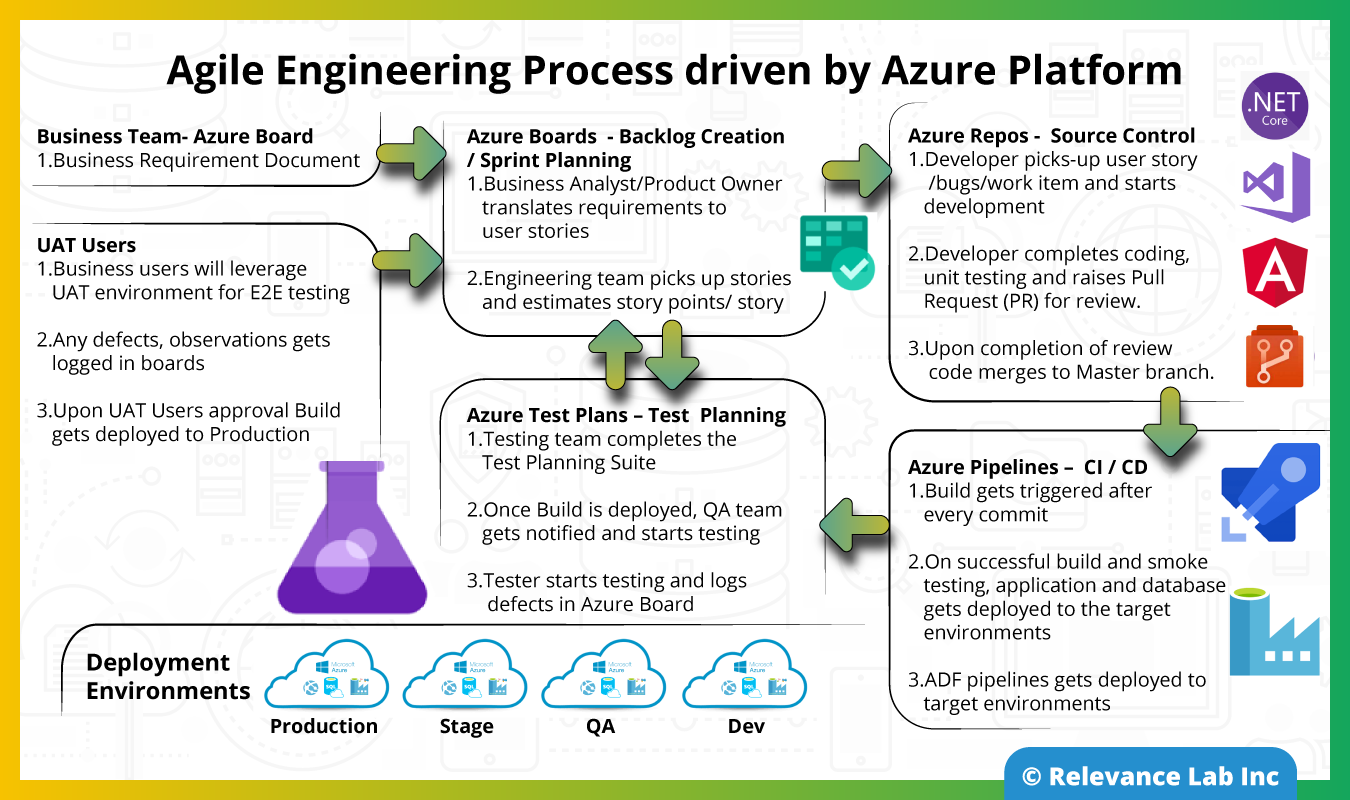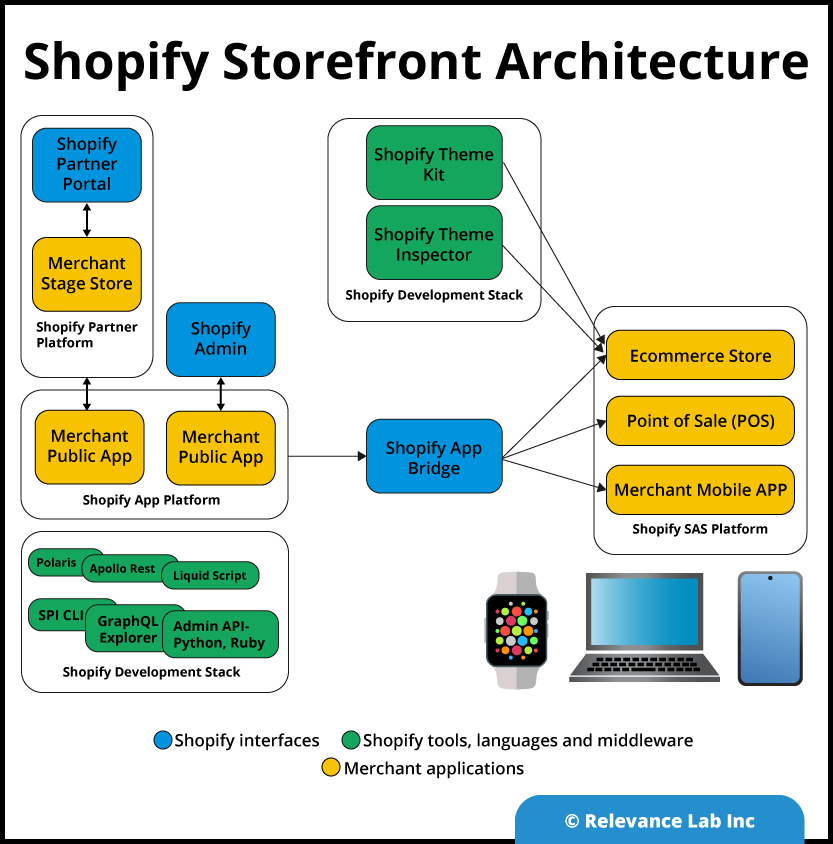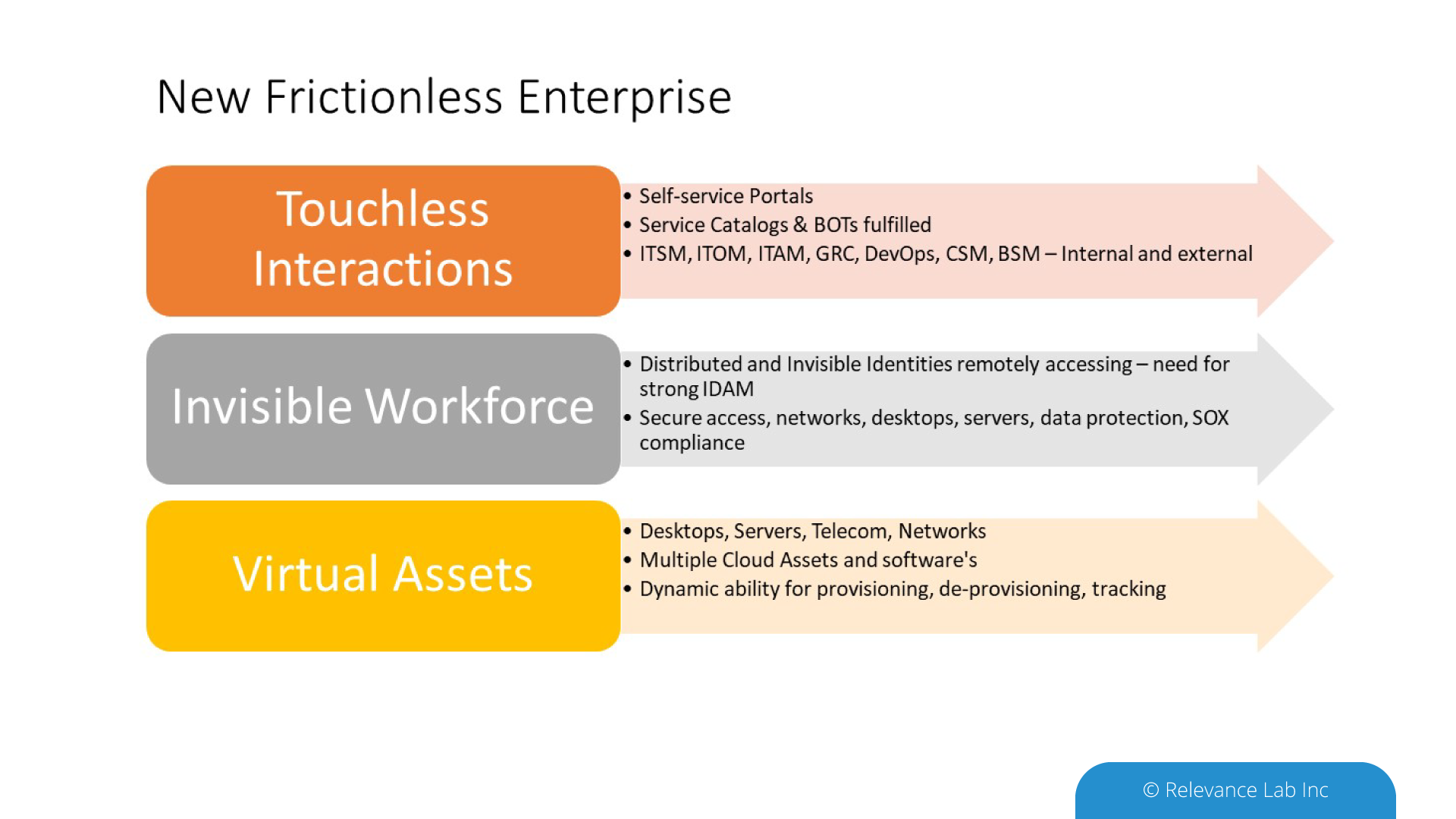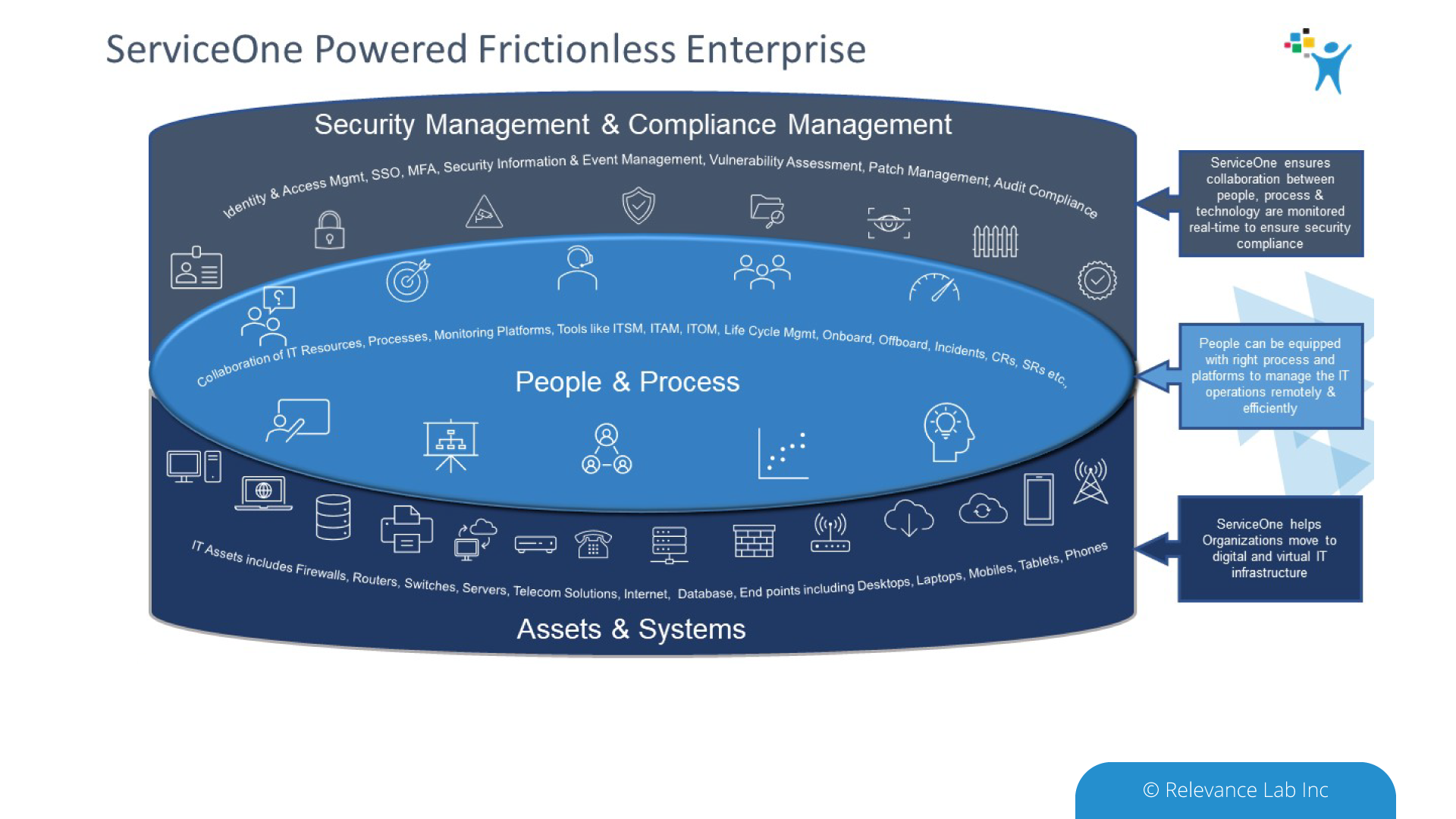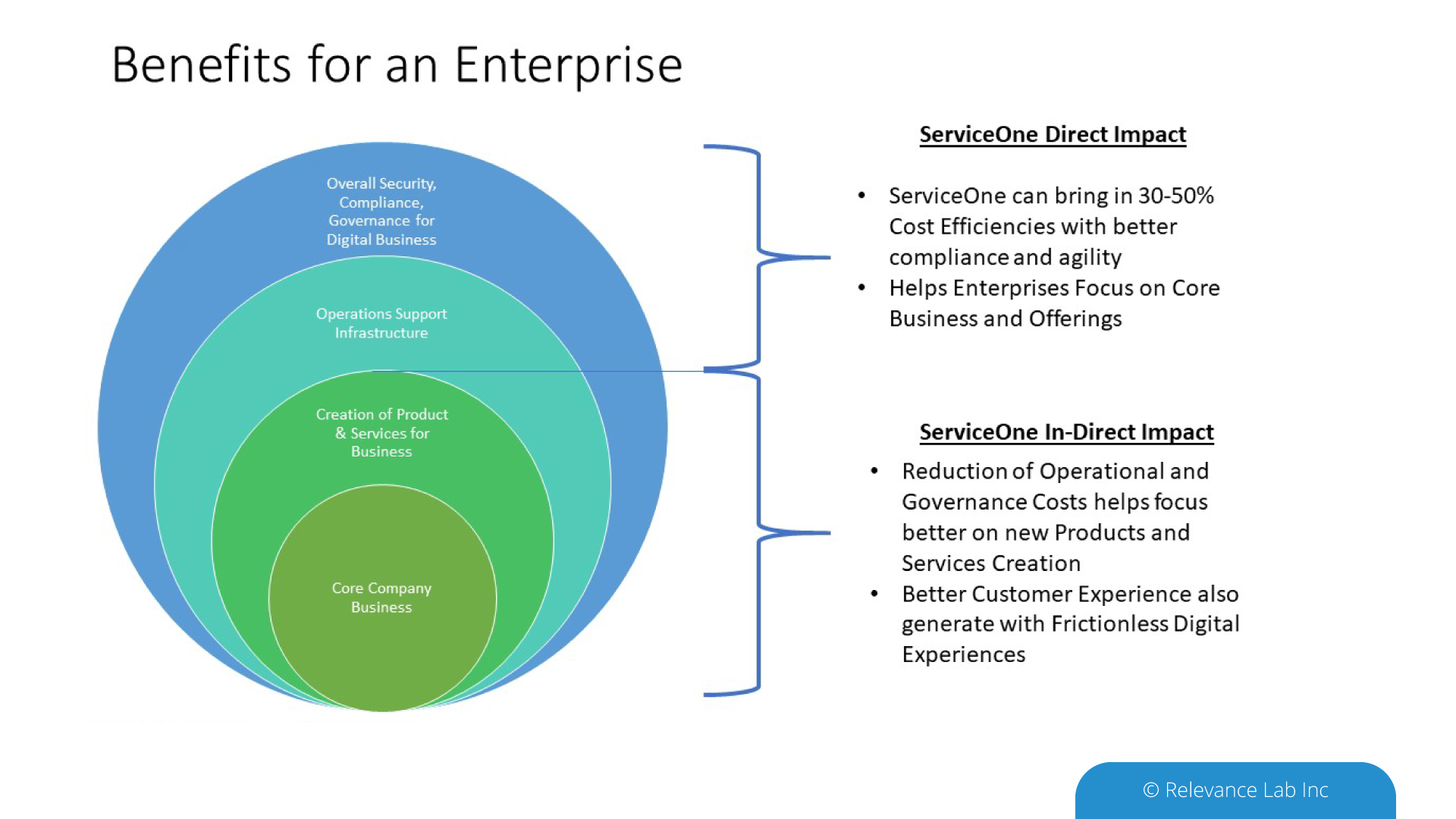2023 Blog, Blog, Digital Blog, Feature Blog, Featured
Relevance Lab’s (RL) focus on addressing the digital transformation jigsaw puzzle has a strategic investment in leveraging Products & Platforms to create a unique differentiation and competitive advantage. We are a specialist Cloud, DevOps, Automation, and Analytics Services company with an IP (Intellectual Property) led technology strategy. This helps our customers achieve frictionless business outcomes by leveraging cloud across their infrastructure, applications, and data.
We optimize IT spending with smart cloud workload migration, reducing ongoing operations costs by leveraging automation & governance, speeding up innovation in the delivery of new software products with Agile & DevOps, and getting key real-time business insights with Actionable Analytics.
The key platforms and playbooks that we have are the following:
- RLCatalyst for IT Optimization
- SPECTRA for Business Optimization
RLCatalyst provides an “Automation-First” approach for Enterprise Cloud Orchestration across “Plan, Build & Run” lifecycle, leveraging our unique IP. A pre-built library of quick-starts, BOTs and open-source solutions helps customers use Cloud “The Right Way” focused on best practices like “Infrastructure as Code” and “Compliance as Code”. We also have unique specialization on AWS and ServiceNow platforms leveraged to provide Intelligent Cloud Operations & managed services with our ServiceOne platform covering workload migration, security, governance, CMDB, ITSM, and DevOps.
SPECTRA provides a Digital and Agile Analytics platform that helps build enterprise data lakes and Supply Chain analytics with multiple ERP systems connectors (SAP, Oracle, Dynamics, JDE, etc.). It also provides a smart-document search engine for Google-like features on enterprise digital documents (images, PDF, engg drawings, etc.). We leverage the Digital platforms for Frictionless Application modernization and Cloud Product Engineering services extending across platforms covering content, commerce, CRM, and supply chain (Adobe, Shopify, SFDC, Oracle Fusion, Azure PowerApps, Services & ADF) integrated with actionable insights from SPECTRA.
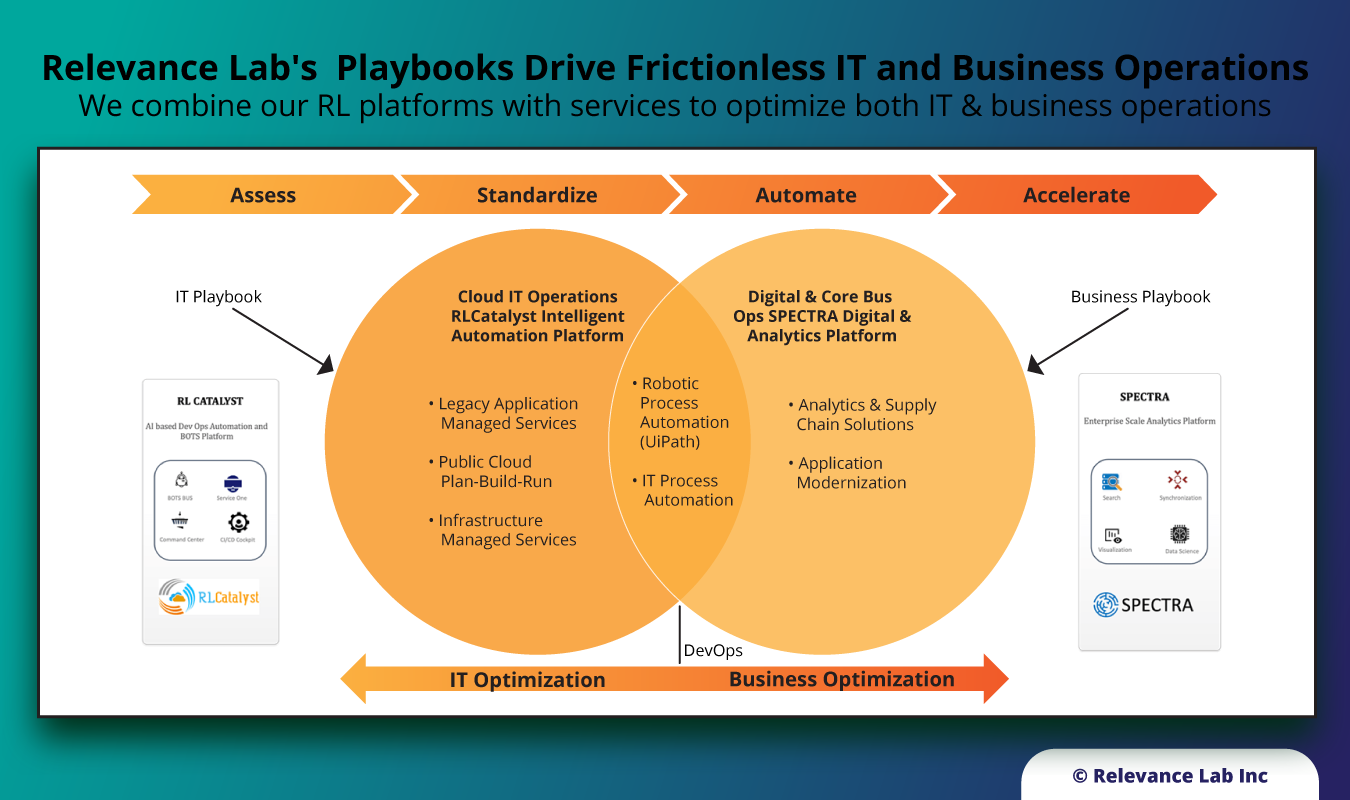
The figure above explains our company’s focus in driving frictionless IT and business operations leveraging these key platforms. The focus on a “coded business model” that the platforms deliver help us engage across the full lifecycle with customers covering the following stages:
- Assess the key customer needs as each customer has a unique model we evaluate based on 3C’s (Culture, Content, & Constraints)
- Standardize the internal systems, processes, engineering practices, and governance
- Automate everything repetitive impacting speed, costs, quality, and compliance
- Accelerate the achievement of business objectives with faster software delivery, better operational excellence, and real-time Agile Analytics
RLCatalyst Platform and ServiceOne Solution
RLCatalyst is an intelligent automation platform built with DevOps, Cloud, and Automation features covering infrastructure, applications, data, and workflows. RLCatalyst common services foundation is built using an open architecture in line with the industry standards and can be customized. On top of the foundation services, a set of specialized products, solutions, and services are created to cover the specialized needs of customers. Following are a few key foundation themes for RLCatalyst:
- Built on Open-source products to provide flexibility and scalability for hybrid cloud deployments
- Uses “Infrastructure as Code” best practices and DevOps standards covering CI/CD, end-to-end monitoring, and orchestration
- The platform is built to have a UI Portal front-end, Node.JS API-based backend, integration layer for executing BOTs, and database layer based on NoSQL
- The core concept uses a “self-aware” paradigm to embed dynamic configurations, end-to-end monitoring, and dynamic CMDB to enable smart operations using other ITSM and Cloud platforms
- The Cloud Portal drives self-service models of DevOps and can be customized to add domain-specific business rules for customers or industry type
- There is “Compliance as Code” embedded into the design to make sure customers can be aligned with well-architected principles
- The platform is built on top of AWS and ServiceNow ecosystem but can also be deployed on-prem or other cloud platforms
- The solutions are pre-integrated with other popular DevOps and Cloud tools like Docker, Chef, Anisible, Terraform, Jenkins, ELK, Sensu, Consul, etc
- The platform comes with a pre-built library of BOTs and Quickstart templates
The combination of RLCatalyst and ServiceOne integrated solution provides an intelligent automation architecture, as explained in the figure below. The key building blocks are:
- Discover the underlying assets, health, costs, vulnerability, security, and compliance.
- Automate using a framework of BOTs built with self-aware intelligence covering tasks, workflows, decisioning, and AI/ML algorithms.
- Resolve at speed all service management tickets and requests with complex workflows & integration across multiple systems
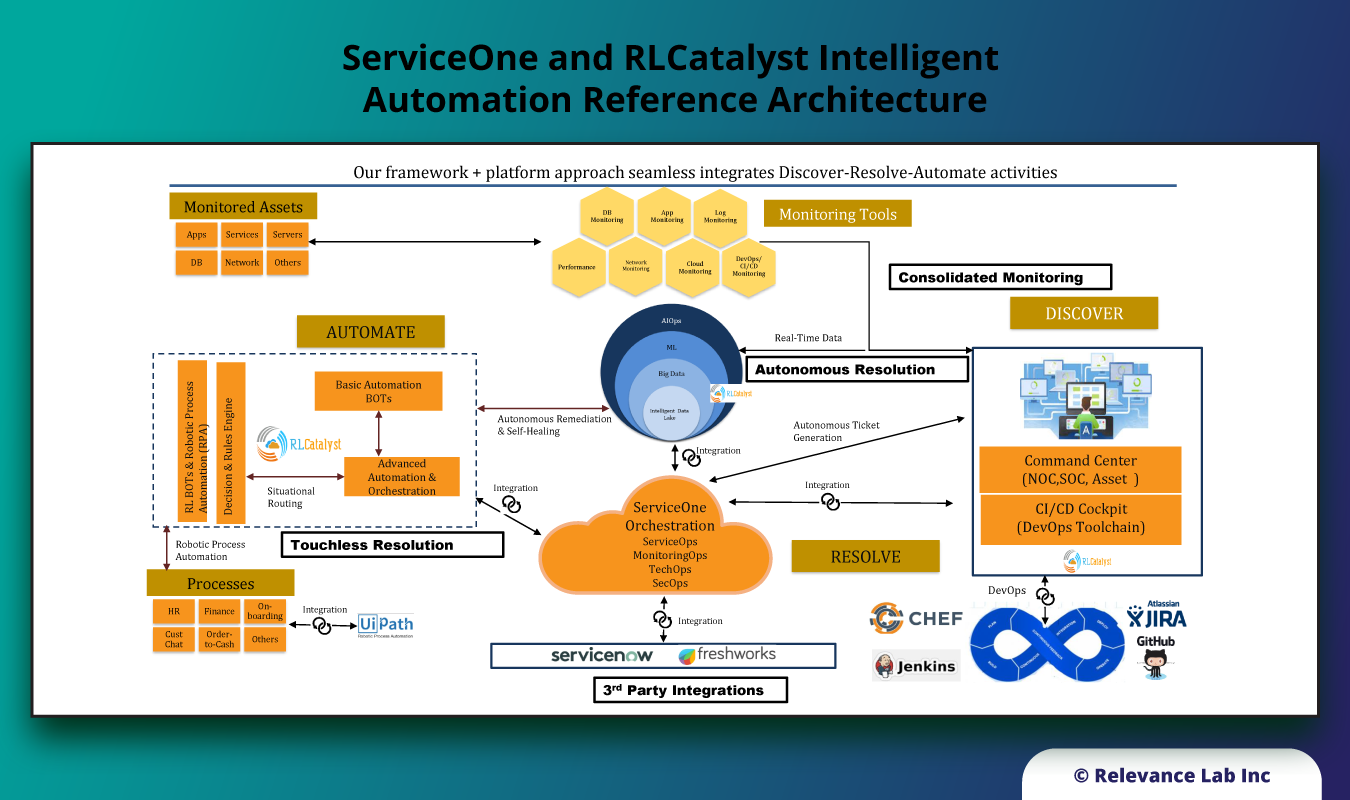
SPECTRA Platform and Business Process Automation
SPECTRA, the AI-driven Analytics platform from Relevance Lab, based on open-source technology, can fast track your journey from data to actionable insights. It can process data from structured data from different ERP Systems based on pre-existing adapters and unstructured data from PDFs, Emails, engineering drawings, and commercial labels. Every organization has invested in a combination of tools, technologies and solutions to create their Data platforms. However, most of these platforms are built with legacy technologies or fragmented components. When companies try to leverage the new technologies of Big Data, Cloud Architectures and Artificial Intelligence to achieve more meaningful Analytics a pre-built Platform like SPECTRA can save tremendous efforts, costs and time to provide a scalable and flexible alternative.
Similar to the RLCatalyst IT Optimization we leverage SPECTRA Platform for Business Optimization with Agile Analytics, as explained in figure below.
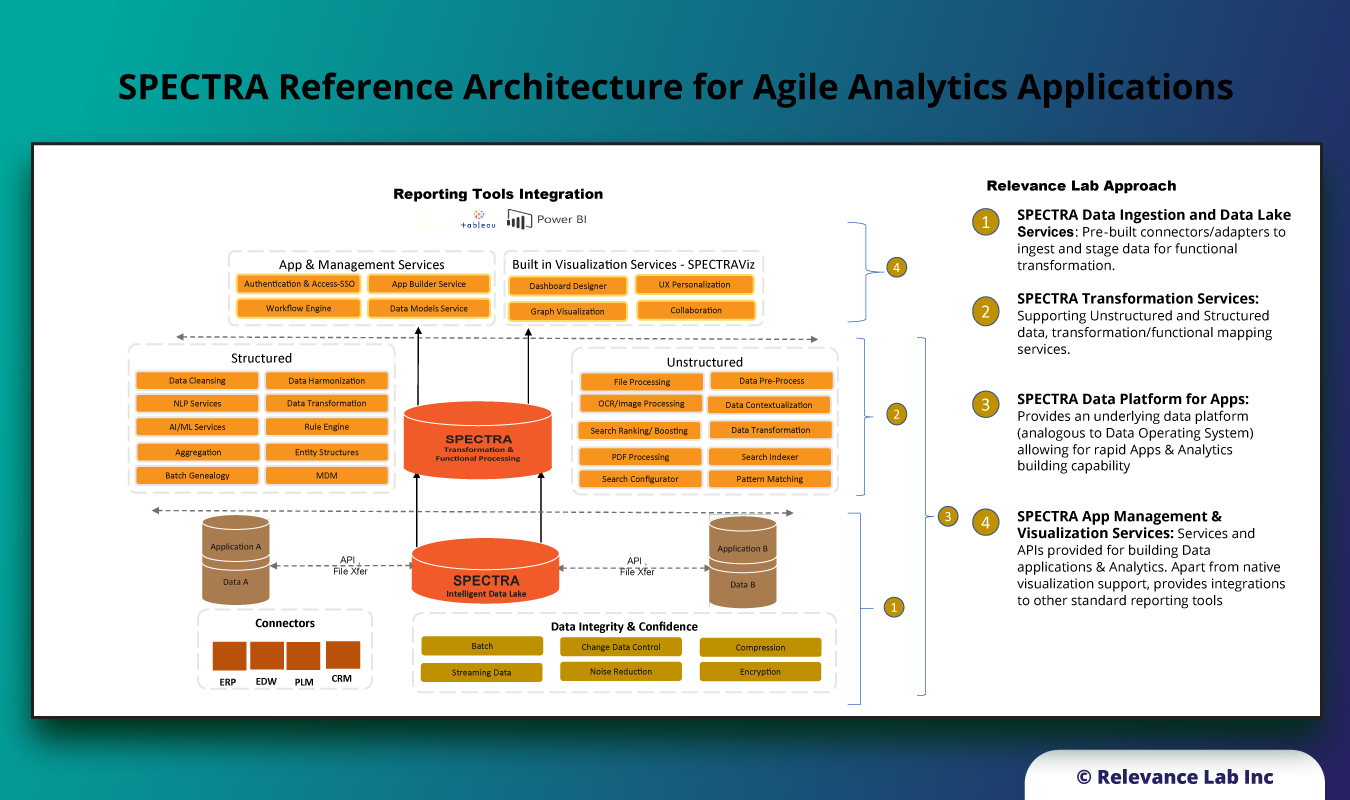
We have also leveraged SPECTRA Platform and UiPath Integration to Achieve business process hyper automation, as explained briefly below.
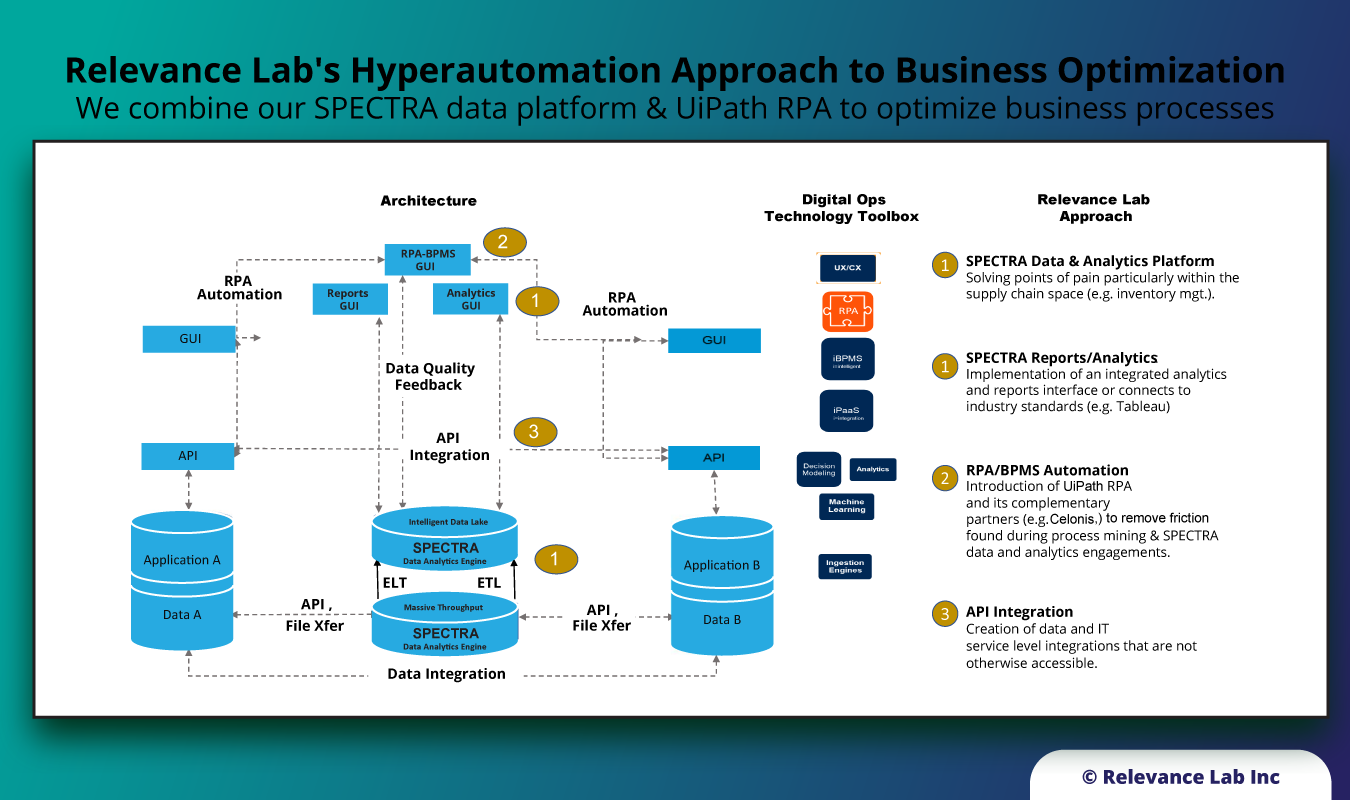
Customer Impact with RL Playbooks for IT and Business Transformation
Relevance Lab leverages our strengths in platforms for all our customer engagements to bring out special value on services delivery in areas of:
- Cloud Infrastructure Automation
- Data Analytics Platforms
- Digital Applications and Product Engineering
- Intelligent Operations and DevOps
The figure below highlights the value created for some of our key customers.
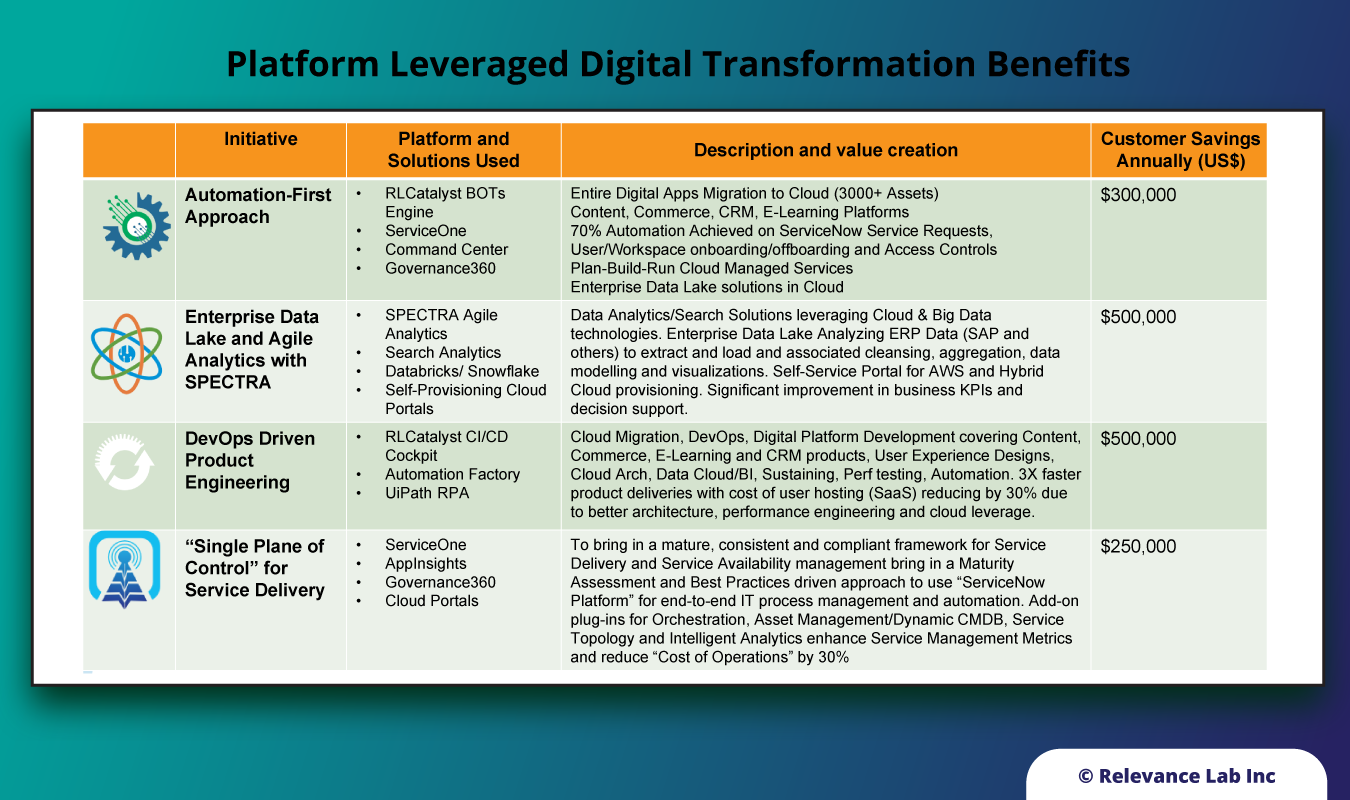
We have adopted the following maturity model as a specialist technology company with significant investments on competency and IP creation that guides the investments in RLCatalyst and SPECTRA platforms.
| Level-1 | Deep Technology Expertise | Continuous learning and skills upgrade on latest/emerging Technologies focus across Cloud, Automation, Analytics, DevOps, Digital |
|---|---|---|
| Level-2 | Focus on Certifications – Basic & Advanced | Promoting “Industry Certifications” to benchmark the competencies against the global standards and make this part of every developer’s career enhancement goal |
| Level-3 | Solutions and Best Practices (Process & Tools) | Focus on customer solutions and recurring use cases to build a knowledge base of best practices across software engineering, operations excellence, business domains |
| Level-4 | Platform Focus | “Codified Knowledge” in the form of Platforms for Data Analytics, DevOps, Cloud & Automation with source code in re-usable formats. Well-Architected Frameworks and leveraging open-source platforms with custom component enhancements & integrations to save effort, time, and improved quality with each new engagement |
| Level-5 | Product Offerings | Prescriptive and pre-created products that customers can use in a “touchless” manner as SaaS or Marketplace offerings like a typical ISV solution with little or no dependency on associated professional services. Major benefit in enabling frictionless jumpstart on specific business problems. |
Summary
Relevance Lab has made significant investments in creating IT and Business Transformation platforms that provide us a key competitive advantage in unlocking value for our customers across DevOps, Analytics, Cloud, Automation and Digital Engineering. By following a service maturity model that goes beyond just headcount and competencies we have been able to bring the value of platform and products to solve the digital transformation puzzle for our 50+ customers.
To know more about how can our products and platforms help feel free to contact us marketing@relevancelab.com.
